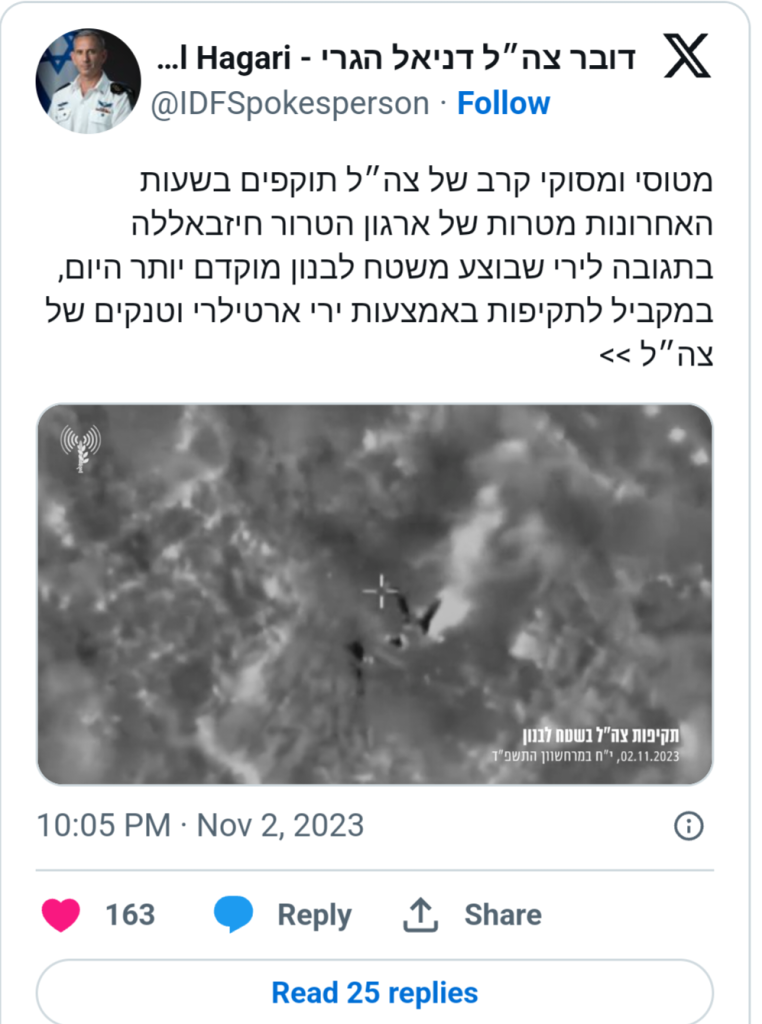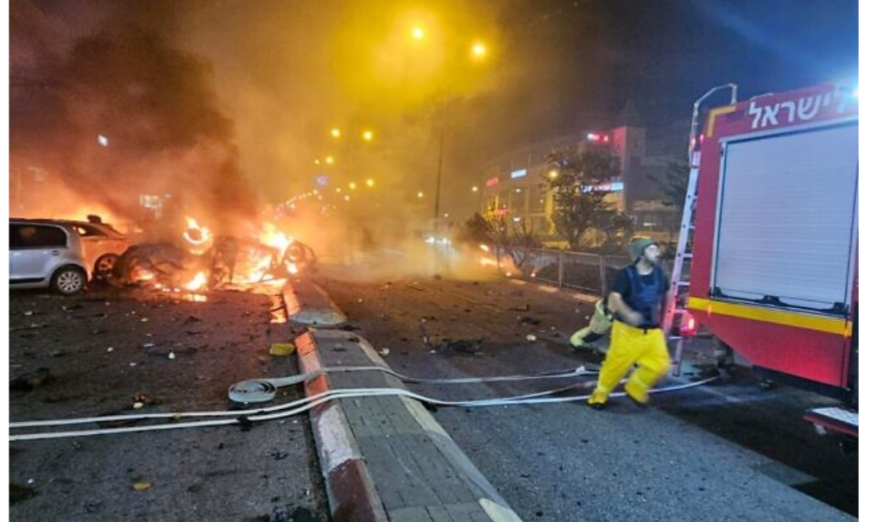Firefighters battle blazes in Kiryat Shmona after Hamas fires rockets from Lebanon. (Fire and Rescue Services.)
Rocket fire from southern Lebanon rained on Israel Thursday, causing widespread damage in the northern city of Kiryat Shmona as skirmishes on the northern border intensified, and an Iranian-sponsored militia originally deployed to Syria began bolstering the Hezbollah terror group.
Rocket sirens sounded in northern communities throughout the evening, with at least one projectile impacting in Kiryat Shmona, setting stores and cars in the largely evacuated city alight.
The Hamas terror group claimed responsibility for the barrage, saying it fired 12 rockets.
The Israel Defense Forces responded to the strike and earlier attacks with several rounds of strikes on Hezbollah positions.
The flare-up came after several days of relative quiet on the northern border, which has seen tensions heat up amid attempts by Hezbollah and allied groups to put pressure on Israel’s military as it advances a ground offensive on the Gaza Strip. Iran-backed groups in Yemen have also attempted to attack Israel from the south in recent days, and other allied militias have taken aim at bases housing US troops in Iraq and Syria.
The Magen David Adom ambulance service said its medics treated two people who were wounded in the rocket fire on Kiryat Shmona, including a 25-year-old in moderate condition due to shrapnel and a 40-year-old lightly hurt as a result of the blast. The pair were taken to Ziv Hospital in Safed.
The city, as well as 42 border communities, were evacuated last month by the military and Defense Ministry amid the repeated attacks. Many residents in northern towns independently evacuated southward amid the escalating attacks.
In its response to rocket fire earlier, the IDF said that among the targets hit so far by fighter jets, tanks, and artillery are military headquarters, rocket launching positions, weapons storage sites, military complexes, and other infrastructure belonging to Hezbollah, publishing footage of the strikes.
Lebanon’s official National News Agency reported Thursday evening that four people were killed and others wounded in Israeli fire along the border, while Hezbollah announced another of its operatives was killed.
The deaths raised to 71 the number killed in Lebanon since the Israel-Hamas war began, according to an AFP tally — most of them Hezbollah or Hamas members, but also some civilians. On the Israeli side, the IDF says that nine people have died — eight soldiers and one civilian.

The Israeli army said earlier in the day that a surface-to-air missile was launched at an unmanned aerial vehicle overnight. The UAV was not hit. In response the military struck the cell behind the launch, as well as the launch site, it said.
In addition, ground forces fired artillery shells toward the source of rocket fire after projectiles were launched at the Mount Dov and Mount Hermon region.
The military did not identify the alleged attackers in either case, while Hezbollah claimed that it sent two suicide drones to Mount Dov. Israel has faced a steady drip of Hezbollah-led attacks along its northern border since the start of its war with Hamas on October 7.
Earlier Thursday, the IDF said it struck an anti-tank guided missile squad in southern Lebanon preparing an attack against northern Israel.
The military said it also hit another two anti-tank squad positions in the area.
Separately, a missile was fired by Hezbollah terrorists at an IDF position near Manara, causing no injuries, the military said.
The Hezbollah terror group claimed to have attacked 19 Israeli military sites along the Lebanon border Thursday. It said the simultaneous attack in the afternoon was carried out with missiles, mortars, and other light arms.
According to Hezbollah, 51 of its fighters have been killed in Israeli strikes since the outbreak of war on October 7.
Six Israeli soldiers and eight Palestinian gunmen have been killed in the exchanges. One Israeli civilian was killed in a Hezbollah attack, and four Lebanese civilians and a journalist were also reportedly killed by Israeli shelling.
Lebanon’s National News Agency reported that two bodies of Lebanese shepherds, aged 20 and 21, were found by the border after being injured in the crossfire.
The UN peacekeeping force in Lebanon said it had received a request to evacuate two injured people in the area on Wednesday, but a search had been called off due to darkness, Reuters reported.
The military said it was probing the reported incident.
The ramp-up of fighting came a day before Hezbollah leader Hassan Nasrallah was scheduled to speak publicly on Israel’s war with Hamas for the first time, in an address that will be closely watched for signs of whether the terror group intends to open up a second front against Israel, despite repeated warnings by the US, which has sent large naval forces to the region to deter the Iran proxy.
The attacks from Lebanon have so far remained limited in scope, amid threats from Israel that Lebanon will suffer if Hezbollah steps up its assault.
According to IDF Arabic-language spokesman Avichay Adraee, Hezbollah is now being backed by the Iranian Imam Hussein Brigade, threatening to target it as well.
“The militia has engaged in confrontation with the IDF in recent weeks along the Lebanese border,” he wrote on X.
“Hezbollah and the Imam Hussein Brigade will cause Lebanon to pay a heavy price for the benefit of Hamas-ISIS. The IDF is fully prepared to respond to anyone who tries to undermine its sovereignty in the north,” he added.
The Alma Research Center, which follows security developments along Israel’s northern border, said that the Imam Hussein Brigade is a militia composed primarily of Iraqi Shiites that was integrated into the Fourth Division of the regular Syrian army and operates mainly in the Damascus area.
It has reportedly conducted direct offensive operations against Israel and American soldiers in Syria. The whole Fourth Division, commanded by Maher Assad, brother of Syrian President Bashar Assad, has evolved into an Iranian proxy and reports directly to the Quds Force, the expeditionary arm of the Iranian Revolutionary Guards, the Center says.
During a tour of the northern communities Thursday, MK Gadi Eisenkot of the opposition National Unity party, a former IDF chief of staff, warned those seeking to attack Israel like Hamas did on October 7.
“Our message to all those considering imitating the bloody attack and harming Israeli sovereignty is clear — Israel will eliminate their military capability, eliminate their leaders, destroy their governing position, and seriously harm a country that allows or supports such an attempt,” he said.
Iran-backed Hezbollah has fired dozens of anti-tank guided missiles, rockets and mortars at Israeli military positions and Israeli towns since the murderous October 7 Hamas onslaught. It also sent gunmen — some affiliated with Palestinian terror groups — to infiltrate northern Israel. Several drones have been intercepted over northern Israel.
The IDF has reported striking dozens of terror cells in southern Lebanon in recent days.

An Israeli army battle tank moves at a position in the Upper Galilee near the border with Lebanon on November 1, 2023.

